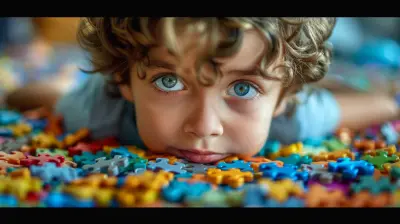How to Help Your Child Build Self-Esteem in a Social Media-Driven World
19 April 2025
Let’s face it—being a kid in today’s world isn’t a walk in the park. Between Snapchat streaks, Instagram likes, TikTok trends, and the constant scroll of picture-perfect influencers, it’s enough to make any child—or adult, for that matter—question their worth. Social media has its upsides, sure, but it can also wreak havoc on a child’s self-esteem. So, how can you help your kid feel good about themselves when the digital world keeps shouting, “You’re not enough”? Don’t worry, you’ve landed in the right place. Let’s tackle this together.

What Is Self-Esteem, Really?
Before we dive in, let’s break it down: self-esteem is essentially how you feel about yourself. It’s your inner voice saying, “I’ve got this!” or, on tough days, “I’m not good enough.” For kids, their self-esteem is still under construction—it’s like a house that hasn’t been fully built yet. And unfortunately, social media can often feel like a wrecking ball, ready to tear down any progress they make.But the good news? You, as a parent, can be their architect, helping them design a solid foundation that’s strong enough to withstand even the harshest online storms. So, let’s get to it.
Understanding the Social Media Pressure Cooker
The Comparison Trap
Ever heard the phrase, “Comparison is the thief of joy”? Social media practically thrives on comparisons. Kids see their friends posting about exotic vacations, scoring straight A’s, or hanging out with a big group of smiling faces, and it’s easy for them to feel left out. What they don’t realize is that they’re not comparing apples to apples—they’re comparing their behind-the-scenes life to someone else’s highlight reel.Filters and Unrealistic Expectations
Then there are the filters. Instagram filters, beauty apps, and editing tricks create perfection that’s not even close to real. To your kid, though, it looks like everyone else has flawless skin, perfect hair, and lives in a spotless, aesthetic bedroom. This constant exposure to unattainable ideals can chip away at their self-esteem, one swipe at a time.
Signs Your Child May Be Struggling with Self-Esteem
Not every child is going to come out and say, “Hey Mom/Dad, I don’t feel good about myself.” (Wouldn’t that make things easier?) Instead, you might notice some subtle signs, like:- Avoidance: They might shy away from trying new things or avoid social situations.
- Self-Criticism: They may put themselves down, saying things like “I’m so stupid” or “I’m not good at anything.”
- Over-Focus on Likes and Comments: If they’re obsessing over how their posts perform online, it might be a red flag.
- Changes in Mood: Low self-esteem can sometimes manifest as irritability, sadness, or even anxiety.
Notice any of these? Don’t panic. It just means your child might need a little extra support.
10 Ways to Boost Your Child's Self-Esteem in a Social Media World
1. Teach Them About the "Highlight Reel" Phenomenon
Sit your kid down and have an honest chat about how social media works. Explain how most people only post their best moments, not their struggles. You could even show them some “before and after” photos online—like those that reveal what influencers look like without filters. It’ll help them see that not everything online is as perfect as it seems.2. Praise Effort, Not Just Results
Kids need to know that their worth isn’t tied to winning awards or acing tests. Start praising their effort instead of just the outcome. Did they practice really hard for that piano recital, even if they made a mistake? Celebrate that. Let them know it’s about trying their best, not being the best.3. Encourage Offline Activities
Getting your child involved in hobbies outside of social media is a game-changer. Whether it’s painting, soccer, or coding, offline activities give kids a chance to develop real-world skills and confidence. Plus, it’s time spent away from their screens!4. Be a Role Model
Kids are like sponges—they’re always soaking up what you do. So, if you’re glued to your phone, comparing yourself to others, or overly critical of yourself, they’ll notice. Instead, model positive behavior. Show them what self-acceptance looks like by being kind to yourself.5. Limit Screen Time
Okay, this one might sound obvious, but it’s easier said than done. Setting boundaries around screen time prevents your child from falling into the doom scroll trap. And hey, you can make it a family thing—schedule screen-free dinners or set a “no phones before bed” rule.6. Create a Safe Space for Open Conversations
Make sure your child feels like they can talk to you about anything—without fear of judgment or punishment. If they’re feeling down because of social media, they’ll be more likely to open up if they know you’re there to listen, not lecture.7. Help Them Set Realistic Goals
Kids often feel bad about themselves because they’re chasing goals that are way out of reach. Sit down with them and help them set realistic, achievable goals. It’s like giving them a map—they’ll feel more confident knowing they’re taking manageable steps instead of leaping into the unknown.8. Celebrate Their Strengths
Every child has something they’re good at. Maybe they’re a math whiz, a great friend, or a natural artist. Make it a point to remind them of their strengths regularly. Think of it as recharging their confidence battery.9. Educate Them About Social Media Algorithms
This one’s for the tech-savvy parents. Teach your child how social media algorithms work—how they’re designed to keep users hooked by showing them content that’s often exaggerated or unrealistic. Understanding the “behind-the-scenes” can make social media feel less like real life and more like a curated show.10. Encourage Positive Self-Talk
This might sound cheesy, but it works! Teach your child to challenge their inner critic. Instead of saying, “I’m so bad at this,” they could reframe it to, “I’m still learning, and it’s okay not to be perfect.” Small mindset shifts can make a huge difference.The Role of Family in Building Self-Esteem
Here’s the thing: self-esteem doesn’t grow in isolation. It’s nurtured in relationships—especially within families. Make sure you’re spending quality time together, laughing, talking, and creating memories. When kids feel loved and valued at home, they’re less likely to seek validation from the digital world.Also, don’t forget to check in with yourself. Parenting in this digital age can be overwhelming, and it’s okay to feel like you don’t have all the answers. Remember, you’re doing your best, and that’s more than enough.
Final Thoughts
Building your child’s self-esteem in a social media-driven world isn’t about shielding them from everything—it’s about equipping them with the tools they need to navigate it. It’s about teaching them that their value doesn’t come from likes, followers, or filters, but from who they are as a person. And with your support, they’ll be ready to take on the digital world with confidence.So, take a deep breath. You’ve got this. And more importantly, they’ve got this too—because they’ve got you in their corner.
all images in this post were generated using AI tools
Category:
Parenting ChallengesAuthor:

Max Shaffer
Discussion
rate this article
5 comments
Brick Carr
Great insights! Encouraging open conversations about social media and its impacts can empower children. Additionally, celebrating their unique qualities and achievements offline helps foster genuine self-esteem beyond digital validation. Keep up the excellent work!
May 10, 2025 at 2:43 AM

Max Shaffer
Thank you for your thoughtful comment! I completely agree—encouraging open dialogue and celebrating offline achievements are key to fostering true self-esteem. Your support means a lot!
Ella Baxter
Empower your child to embrace their unique identity, prioritize real connections, and ignore the superficial noise of social media.
May 8, 2025 at 4:41 PM

Max Shaffer
Thank you! Emphasizing individuality and authentic connections is crucial for fostering resilience and self-esteem in today’s social media landscape.
Hazel Navarro
Excited to explore new ways to support kids!
April 24, 2025 at 3:32 AM

Max Shaffer
Thank you! It's crucial to find effective ways to nurture our kids' self-esteem in today's digital landscape.
Kira Wolf
Empowering children to navigate social media mindfully fosters resilience and self-worth, helping them cultivate authentic connections and a positive self-image.
April 20, 2025 at 4:00 AM

Max Shaffer
Absolutely! Encouraging mindful social media use equips children with essential skills to build resilience and nurture authentic relationships, ultimately boosting their self-esteem in a digital world.
Kristina Flores
This article offers valuable insights on nurturing self-esteem in children amidst social media pressures. Encouraging open communication, fostering real-life connections, and promoting self-acceptance are crucial. Parents can play a key role in guiding their children to develop a healthy self-image.
April 19, 2025 at 2:26 AM

Max Shaffer
Thank you for your thoughtful comment! I'm glad you found the insights valuable. Encouraging open communication and real-life connections is indeed essential for nurturing self-esteem in today's social media landscape.




